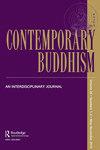BETWEEN COMMON HUMANITY AND PARTIALITY: THE CHOGYE BUDDHIST CHAPLAINCY MANUAL OF THE SOUTH KOREAN MILITARY AND ITS RELEVANCE TO INTERNATIONAL HUMANITARIAN LAW
IF 0.1
3区 哲学
0 PHILOSOPHY
引用次数: 1
Abstract
ABSTRACT The Chogye Order of Korean Buddhism (K. Chogye chong or Jogyejong 曹溪宗) compiled a booklet called Kukkun pŏbyo chip (Essential Buddhist Teachings for the Armed Forces, 國軍法要集, EBTAF hereafter), which is distributed in the military Buddhist temples (K. kun sachal; Ch. jun sisha 軍寺刹) of South Korea. This manual for Buddhist military personnel draws on Buddhist classical texts and teachings to provide them both with doctrinal and practical information, and guidance as well as litanies for chaplains to perform crucial rites such as funerals. At the same time the EBTAF contains some distinctively Korean Buddhist references and ideas, and combines them with elements of Korean nationalism. In this context, this article analyses (1) the ideal traits of Buddhist combatants suggested in the EBTAF and their compliance with international humanitarian law (IHL); (2) the conflicting values illustrated in the booklet between Buddhist soldiers’ religious aspirations to uphold common humanity and the partiality inherent in their governmental affiliation; and (3) a passage to resolve the disparity. While the EBTAF aligns with IHL principles, some parts of it reflect a tension between Buddhist aspirations for peace and the military necessities of the state. Though IHL is not explicitly mentioned in the EBTAF, there is potential for embedding education on mutually complementary Buddhist and IHL values into Korean military chaplaincy.在共同的人性与偏袒之间&韩国军方《清溪佛教牧师手册》及其与国际人道主义法的关联
摘要:朝鲜佛教的昭和会曹溪宗) 编写了一本名为Kukkun pŏbyo-chip(武装部队的基本佛教教学,國軍法要集, EBTAF),分布在军事佛教寺庙中(K.kun-sachal;Ch.jun-sisha軍寺刹) 韩国。这本面向佛教军事人员的手册借鉴了佛教经典文本和教义,为他们提供了教义和实践信息,并为牧师进行葬礼等重要仪式提供了指导和长篇大论。同时,EBTAF包含了一些独特的韩国佛教参考和思想,并将其与韩国民族主义元素相结合。在此背景下,本文分析了(1)EBTAF提出的佛教战斗人员的理想特征及其对国际人道主义法的遵守;(2) 小册子中阐述了佛教士兵维护共同人性的宗教愿望与政府关系中固有的偏袒之间的价值观冲突;以及(3)解决视差的通道。虽然EBTAF与国际人道主义法原则一致,但其中一些部分反映了佛教对和平的渴望与国家军事需求之间的紧张关系。尽管EBTAF中没有明确提到国际人道主义法,但有可能将佛教和国际人道主义价值观相互补充的教育融入韩国军事牧师中。
本文章由计算机程序翻译,如有差异,请以英文原文为准。
求助全文
约1分钟内获得全文
求助全文

 求助内容:
求助内容: 应助结果提醒方式:
应助结果提醒方式:


